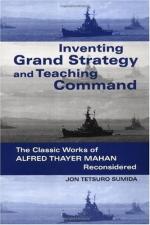|
This section contains 396 words (approx. 2 pages at 300 words per page) |
Encyclopedia of World Biography on Alfred Thayer Mahan
Alfred Thayer Mahan (1840-1914), American naval historian and strategist, provided the intellectual and historical foundations for American imperial expansion.
Alfred Thayer Mahan was born on Sept. 27, 1840. His father was an officer at the U.S. Military Academy at West Point and a professor of civil and military engineering. Young Mahan evidently intended a military career from the beginning. After 2 years at Columbia College he entered the U.S. Naval Academy at Annapolis in 1856, graduating second in his class in 1859.
During the Civil War, Mahan spent most of his time on blockade duty and in the years after the war received a variety of assignments. He became increasingly interested in writing and in 1883 published his first book, The Gulf and Inland Waters, part of the naval history of the Civil War.
Almost immediately thereafter occurred what was probably the decisive event of Mahan's life. He was invited in 1884 to lecture on naval tactics and history at the newly established Naval War College. In outlining his lectures he first formulated the ideas that became the basis of The Influence of Sea Power upon History, 1660-1783 (1890). Up to this point in his life, Mahan had believed that the United States should avoid international involvement and concentrate solely on defense. But his study of the influence of sea power changed his views, and he came to the conclusion that strong naval power was essential to maintain national strength. His book attracted favorable attention and established him as an important military thinker. His other major work was The Influence of Sea Power upon the French Revolution and Empire, 1793-1812 (2 vols., 1892).
Mahan retired in 1896, but during the Spanish-American War he was called to serve on the Naval War Board, an informal advisory body to the secretary of the Navy. After the war he was one of the American representatives to the Hague Disarmament Conference.
Mahan's major influence came from his association with such politicians as John Hay, Henry Cabot Lodge, and Theodore Roosevelt, all of whom were committed to American imperial expansion. In his writings Mahan argued that expansion was a military necessity for the United States. It was largely on the basis of Mahan's ideas, for instance, that President Theodore Roosevelt took steps to acquire the Panama Canal for the United States.
In 1912 Mahan accepted a position at the Carnegie Institution in Washington, D.C. He died on Dec. 1, 1914.
|
This section contains 396 words (approx. 2 pages at 300 words per page) |


